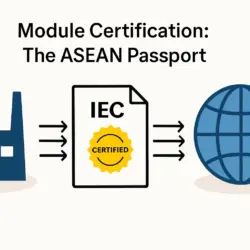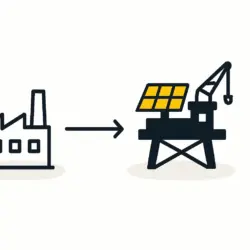Brunei is moving forward with its first large-scale solar project, the 30-Megawatt Solar Photovoltaic Power Plant, aiming to significantly reduce carbon emissions and develop local expertise in renewable energy.
Brunei’s First Large-Scale Brunei solar power Project
Brunei is set to make a significant leap in its renewable energy sector with the development of its first large-scale solar project — the 30-Megawatt Solar Photovoltaic Power Plant. Announced on Tuesday, this initiative is a major step towards reducing the country’s carbon emissions and expanding its renewable energy capacity. The project aligns with broader regional trends across Southeast Asia, where ASEAN nations are increasingly investing in renewables to meet climate commitments and growing energy demands.
The project is a partnership between the Brunei Government, Brunei National Energy Research Institute (BNERI), and a consortium comprising Brunei Shell Petroleum Company (BSP) and TotalEnergies. The power plant, which will utilize photovoltaic panels to convert sunlight directly into electricity, will be located at the former Sungai Liang landfill in the Belait District, demonstrating a productive use for post-closure industrial land.
Impact on Carbon Emissions from Brunei solar power
The solar power plant is expected to reduce Brunei’s carbon dioxide emissions by approximately 36,000 tonnes annually. This reduction is equivalent to removing 7,800 cars from the road each year, highlighting the project’s significant environmental impact. The efficiency of such a plant relies heavily on the quality of its components, from the initial solar panel manufacturing process to the final installation.
The construction of the solar photovoltaic power plant is scheduled to commence in the coming months, with operations expected to begin by 2026. This timeline underscores the government’s commitment to accelerating its renewable energy goals and transitioning towards a more sustainable energy infrastructure.
Developing Local Expertise in Brunei solar power
Beyond its environmental benefits, the project aims to develop local expertise in renewable energy. The involvement of the consortium, led by BSP and TotalEnergies, will provide valuable training and development opportunities for Bruneians. This focus on capacity building is essential for ensuring the long-term sustainability of the country’s renewable energy sector. Cultivating this expertise involves understanding the entire solar value chain, from the basics of solar panel manufacturing to the complex operations of a utility-scale power plant.
In addition to the solar photovoltaic power plant, Brunei is exploring other renewable energy projects. These include large-scale solar projects at the Brunei International Airport and Temburong District, as well as a waste-to-energy plant at the Sungai Akar landfill. For these future initiatives to succeed, a deep understanding of the required investment, including a detailed solar panel manufacturing plant cost breakdown, will be crucial. These initiatives reflect the government’s broader strategy to diversify its energy mix and reduce its reliance on fossil fuels.
Brunei’s Renewable Energy Targets for Brunei solar power
Brunei has set ambitious renewable energy targets as part of its commitment to the Paris Agreement. The country aims to achieve at least 30% renewable energy in its total power generation capacity by 2035. The development of the 30-Megawatt solar photovoltaic power plant is a crucial and foundational step towards meeting this target. It not only contributes directly to the goal but also showcases Brunei’s dedication to a sustainable energy future.
The 30-Megawatt Solar Photovoltaic Power Plant represents a pivotal moment in Brunei’s energy transition. By reducing carbon emissions and building local expertise, the project aligns with the country’s vision for a greener and more sustainable future. As Brunei continues to invest in renewable energy, the nation is poised to play a leading role in the global shift towards clean energy.
If you are inspired by Brunei’s commitment and want to learn more about the technology driving this change, you can start with our free e-course on solar panel manufacturing.



